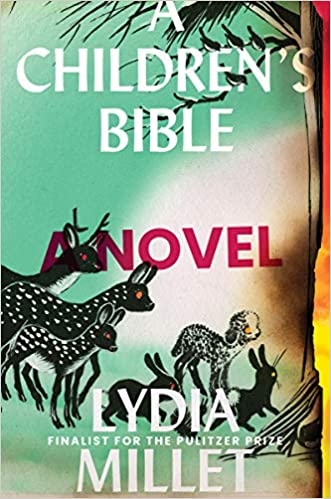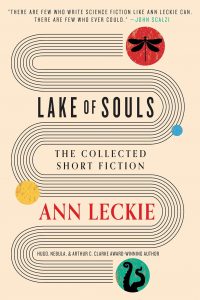Ian Mond Reviews A Children’s Bible by Lydia Millet
 A Children’s Bible, Lydia Millet (Norton 978-1-324-00503-2, $25.95, 224pp, hc) May 2020.
A Children’s Bible, Lydia Millet (Norton 978-1-324-00503-2, $25.95, 224pp, hc) May 2020.
Lydia Millet’s 12th novel, A Children’s Bible, may feature some of the worst parents ever committed to prose. We’re not talking a single mother or father (like Queen Gertrude from Hamlet or Jack Torrance from The Shining) or even a couple (like Ma and Pa Wormwood from Matilda) but rather a gaggle of horrible parents who, with their reluctant children, holiday in a lakeside, palatial retreat ”built by robber barons in the nineteenth century.” What we learn about these ”garbage-like figures that tottered around the great house,” neglecting their children and worshipping a variety of fermented products (”They drank wine and beer and whiskey and gin. Also tequila, rum and vodka. At midday they called it the hair of the dog,”) comes from a biased source – a precocious teenager named Evie. But when a massive storm (one might say of biblical proportions) almost destroys the property, it becomes abundantly clear that Eve’s utter contempt for the adults undersells how awful they indeed are. Following the storm, the children encounter a custodian named Burl who helps Evie, her brother Jack, and the other kids escape their alcoholic parents for the freedom of a farm, a promised land, relatively safe from the rising seas. On arrival at the farm, Burl heads up a hill, where there’s a cell tower, to contact the owner. When he returns, he communicates a set of rules… or commandments… laid down by the owner. ”First rules. Uh. She’s the owner. So we gotta do what she says. And also respect her.”
As you might have guessed, if the title of the novel and the name of the protagonist wasn’t already a giveaway, A Children’s Bible is a story about climate change uniquely structured around Biblical stories (both Old and New). In addition to what I’ve described, Millet punishes the parents with a plague (though she stops from delivering all ten), presents us with a gender-swapped Cain and Abel, and has three wise men (or more accurately three wise men and one wise women) appear during an auspicious birth. Remarkably, these less than subtle nods to scripture – there’s more than I’ve mentioned here – are never distracting or annoying. This is partly because it makes sense to draw a link between the apocalyptic tendencies of the Bible with the impending climate catastrophe, especially when you consider the emphasis the Testaments, Old and New, place on family, on generational shift (all that begetting), on the environment (check out Exodus and Deuteronomy), and the possibility for redemption and renewal. But it’s also partly because A Children’s Bible happens to be a very funny and moving novel. Evie is a delightful character who can be vicious and acerbic, but also deadpan, especially this laugh-out-loud description of her parents:
My mother taught feminist theory, and my father sculpted enormous busty women, lips, breasts, and private part as garishly painted. Often with scenes of war torn or famine struck locations. The labia might be Mogadishu. He was quite successful.
At the same time, Evie’s love for her younger brother Jack (”hands down my favorite person”), including her attempts to underplay the shit-show that is the climate catastrophe, is not only poignant but also reflects the difficult conversations I’ve been having with my children. And this segues back to Millet’s caricature of the parents. Evie’s condemnation of them echoes Greta Thunberg standing before world leaders and calling out their inaction on climate change. As Evie remarks, ”We knew who was responsible, of course: it had been a done deal before we were born.” The final pages of A Children’s Bible are a sobering reminder of the environmental tragedy we will all face if we don’t act now (assuming it’s not already too late). But they’re also tempered with a modicum of hope, a belief based on faith alone, that this current generation, inspired by the determination, the anger, the activism of extraordinary teenagers ill somehow redeem and forgive the sins of their fathers and mothers.
This review and more like it in the July 2020 issue of Locus.
 While you are here, please take a moment to support Locus with a one-time or recurring donation. We rely on reader donations to keep the magazine and site going, and would like to keep the site paywall free, but WE NEED YOUR FINANCIAL SUPPORT to continue quality coverage of the science fiction and fantasy field.
While you are here, please take a moment to support Locus with a one-time or recurring donation. We rely on reader donations to keep the magazine and site going, and would like to keep the site paywall free, but WE NEED YOUR FINANCIAL SUPPORT to continue quality coverage of the science fiction and fantasy field.




